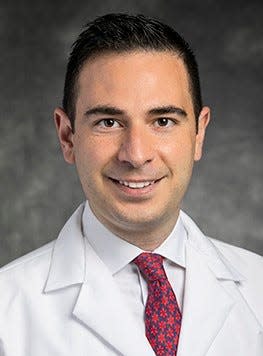Dr. Ghayda discusses kidney stones in men.
The kidneys, ureters and bladder make up the urinary tract in the body. The urinary tract makes, transports, and stores urine in the body. The kidneys make urine from water and your body's waste. The urine then travels down the ureters into the bladder, where it is stored. Urine leaves your body through the urethra.
Healthy kidneys clean waste from the blood help control the levels of sodium, potassium and calcium in the blood. Kidney stones are a problem that can occur in the kidneys. Treatment of kidney stones is typically done by a urologist, who is a doctor specializing in the treatment of urinary tract conditions and diseases.

Causes of kidney stones
Kidney stones are usually caused by a buildup of calcium or uric acid in the kidneys. Calcium stones can form when there is too much calcium in the urine or can be a result of other conditions with normal levels of calcium in the urine. Uric acid stones happen when this waste product isn’t dissolved properly in the kidneys and forms stones.
When urine volume is low it cannot keep salts dissolved and stones can form. Low urine volume can be from dehydration as a result of exercise or working in a hot place. It can also be from not drinking enough fluids. A diet high in calcium intake can cause calcium stones. A diet high in animal protein, like beef, chicken and fish can also result in both types of kidney stones.
Symptoms of kidney stones
Sudden, severe pain in one side of the lower back and into the groin is the most common symptom. Other symptoms are trouble urinating, pain with urination or feeling the intense need to urinate and not being able to. People with kidney stones can experience blood in the urine, nausea, and vomiting. Men can experience pain in the tip of the penis. Certain conditions can increase the risk of kidneys stones. Obesity and bowel conditions, like Crohn’s disease, increase the risk. Certain medications and having a family history also increase the risk of developing kidney stones.
Treatment of kidney stones
There are different types of treatment options depending on size of the stone, length of time having problems with kidney stones, and severity of symptoms. Sometimes, treatment may be to let the stone pass on its own when the stones are small. There are medications, like Flomax that can be prescribed to help stones pass on their own. There are also several types of surgeries that can be used to treat kidney stones. Shock wave lithotripsy (SWL) uses x-ray and ultrasound to locate a larger stone and fires shock waves to break the stone into tiny pieces. These tiny pieces then pass over a few weeks.
Ureteroscopy (URS) is another type of surgery to help relieve kidney stones. This procedure involves a small telescope into the ureter and then using a small basket-like tool to pull the stone out. Sometimes a stent will be placed in the ureter for several weeks to let smaller stones pass more easily.
Prevention of kidney stones
There are several things to be done to help prevent kidney stones. Diet is important; drink plenty of fluids, consume the recommended amounts of calcium, reduce the amount of salt consumed, eat less meat and eat plenty of fruits and veggies. Sometimes, diet is not enough and a provider will prescribe medications to help prevent the formation of stones (Urologyhealth.org).
University Hospitals Samaritan Medical Center Urology provider, Dr. Ramy Abou Ghayda treats kidney stones in men and women. Ghayda is still providing services in Ashland and will continue to provide you with the same high-quality care to which you have become accustomed. He is only moving his UH Chardon and UH Portage practice locations to the new UH Cutler Center for Men. To schedule an appointment with Dr. Ghayda for the treatment of kidney stones or any other men’s health or urology needs call 419-289-6000 or visit uhhospitals.org.
Christina Vanderpool is the community outreach nurse for University Hospitals Samaritan Medical Center. She can be reached at 419-207-7856 and Christina.Vanderpool@uhhospitals.org.
This article originally appeared on Ashland Times Gazette: Kidney stones: causes, symptoms, treatment and more
